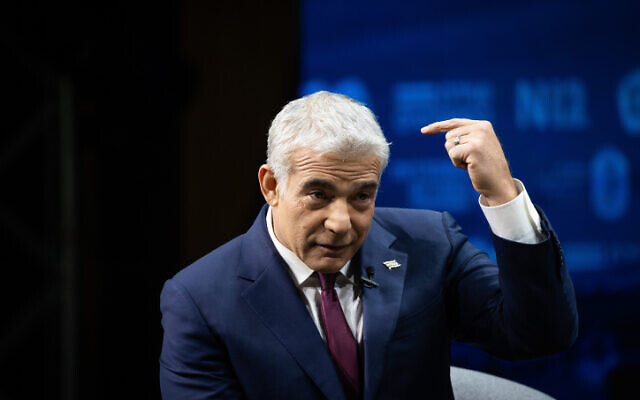Prime Minister Benjamin Netanyahu’s Likud party is seeing a boost in support ahead of next week’s Knesset elections, but neither the premier nor his political rivals have a clear path to forming a government, according to a television poll released Tuesday.
The Channel 12 news survey said Likud would pick up 30 seats if the March 23 elections were held today, two more than the party received in the network’s poll last week. Likud has 36 seats in the outgoing Knesset.
Opposition Leader Yair Lapid’s centrist Yesh Atid party had 18 seats in the poll, down one from last week.
Likud’s gain appeared to come at the expense of the rival right-wing Yamina and New Hope parties, each of which received 10 seats in the poll. The parties got 13 and 11 seats respectively in the previous survey.
The Joint List, an alliance of three majority-Arab factions, got eight seats in the survey, as did the ultra-Orthodox Shas party. Fellow Haredi party United Torah Judaism and the right-wing secularist Yisrael Beytenu got seven seats apiece, while the left-wing Labor got six.
Squeezing past the electoral threshold with four seats each were the far-right Religious Zionists party, Defense Minister Benny Gantz’s Blue and White, the left-wing Meretz and the Islamist Ra’am. It was the first time Ra’am passed the electoral threshold in a Channel 12 survey.
Together Netanyahu’s right-wing religious bloc of Likud, Shas, UTJ and Religious Zionism had 49 seats. Even if Yamina were to join them, the parties would be short of the 61 seats needed for a majority in the 120-seat Knesset.
Parties that have ruled out joining a Netanyahu-led government had 57 seats without Bennett.
Asked who was best suited to be prime minister, 37 percent of respondents said Netanyahu, 21% Lapid, 10% Yamina chief Naftali Bennett and 9% Gideon Sa’ar, the head of New Hope.
The network attributed the increase in support for Likud to growing approval of the government’s handling of the coronavirus pandemic, amid Israel’s successful vaccination campaign and the lifting of lockdown measures. In a survey from two weeks ago, 44% of respondents said the government was doing a good job addressing the health aspects of the pandemic, which rose to 57% in Tuesday’s poll. The share who said the government was doing poorly declined from 53% to 41%.
The survey, conducted by pollster Manu Geva, had 500 respondents and a 4.4% margin of error.
The final surveys are set to be released Friday, after which new polls are barred from being released under Israeli election laws.
Lapid reportedly seeking Ra’am’s support
Also Tuesday, Channel 12 reported Lapid met with Ra’am leader Mansour Abbas five weeks ago in a bid to convince the party to recommend that he form a government after the elections.
The network, which did not cite a source, said Lapid failed to secure a promise of support from Abbas during the meeting, which was aimed at better positioning Lapid to be tasked by the president with putting together a coalition.
Yesh Atid said it doesn’t comment on political meetings but that it is in touch with everyone in the political system and will do everything to replace Netanyahu.

Head of the Yesh Atid party MK Yair Lapid in Jerusalem on March 7, 2021. (Yonatan Sindel/Flash90)
Ra’am, which has emerged as a potential kingmaker, split off from the Joint List shortly after elections were called, vowing to take a more pragmatic approach that did not rule out cooperating with any coalition, be it right- or left-wing, in order to advance the interests of Israel’s Arab citizens.
While members of the Joint List, including Ra’am, recommended Blue and White leader Benny Gantz form the government after the March 2020 election in what was an unprecedented move, the Hadash, Ta’al and Balad factions that currently make up the Arab-majority union have made clear that cooperating with Netanyahu in order to keep him in power is a red line. They cite Netanyahu’s years of marginalizing of the Arab minority that they have deemed unforgivable.
Abbas has said, however, that he is prepared to cooperate with Likud, including on measures to help Netanyahu evade legal trouble, as long as he is able to establish reforms that will benefit Arab Israelis in exchange.

Ra’am party chairman and Joint List MK Mansour Abbas at the Knesset in Jerusalem on November 11, 2020. (Hadas Parush/ Flash90)
But Ra’am may be competing not just against the Joint List for votes, but also the Likud party, which has run an aggressive campaign targeting Arab voters who are starved for change, after decades of feeling that their representatives have failed to provide results.
While horse-race polls are an almost daily occurrence in Israel in the weeks leading up to elections and are not seen as overly reliable, taken together, the surveys can often serve as a general gauge of the political climate and where the vote may be headed.
Previous surveys have generally predicted political deadlock after the election, with no party having a clear path to assembling a majority coalition.
The upcoming elections — the fourth in two years — were called after the power-sharing government of Likud and Blue and White failed to agree on a budget by a December 23 deadline.
The election, like the previous three votes, is largely seen as a referendum on Netanyahu’s rule amid his ongoing trial on corruption charges, as well as his government’s handling of the COVID-19 pandemic.
This article first appeared in The Times of Israel, an Israeli based online newspaper.
Related posts:
Views: 0
 RSS Feed
RSS Feed

















 March 17th, 2021
March 17th, 2021  Awake Goy
Awake Goy  Posted in
Posted in  Tags:
Tags: 
















